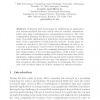195 search results - page 22 / 39 » Hiding the complexity of LBS |
EUROPAR
2007
Springer
14 years 1 months ago
2007
Springer
Abstract. Understanding program behavior is at the foundation of program optimization. Techniques for automatic recognition of program constructs (from now on, computational kernel...
EUROPAR
2007
Springer
14 years 1 months ago
2007
Springer
Abstract. Algorithmic skeletons correspond to a high-level programming model that takes advantage of nestable programming patterns to hide the complexity of parallel/distributed ap...
HPCC
2007
Springer
14 years 1 months ago
2007
Springer
Deploying Grid technologies by distributing an application over several machines has been widely used for scientific simulations, which have large requirements for computational r...
MATES
2007
Springer
14 years 1 months ago
2007
Springer
Developing agent applications is a complex and difficult task due to a variety of reasons. One key aspect making multi-agent systems more complicated than traditional applications ...
CCECE
2006
IEEE
14 years 1 months ago
2006
IEEE
To help programmers of high-performance computing (HPC) systems avoid communication-related errors, we employ a formal process algebra, Communicating Sequential Processes (CSP), w...



